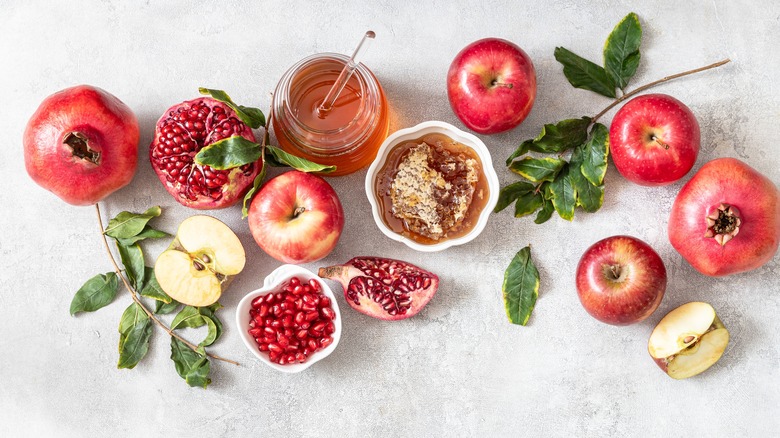The Symbolic Meaning Of Apples And Honey During Rosh Hashanah
Rosh Hashanah marks the beginning of the Jewish New Year (also known as the Day of Judgment), and with it comes all sorts of religious traditions, including eating apples dipped in honey. This gesture symbolizes the wish for a sweet new year. There are other metaphors that strengthen the significance of these foods, including good health. Apples are also likened to Jacob and harken back to Adam and Eve.
Honey was very important to ancient Jews since they didn't have sugar – though at the time, a honey-like syrup made from dates or other dried fruits was most widely used. This would have been an ingredient in a sweet cake said to have been served to King David. Also, the word honey translated into Hebrew (dvash) holds numerological significance, which relates it to the words for "Father of Mercy." The bees themselves may even symbolize the idea of a creator that is "stern but merciful" (per Smithsonian Magazine).
These layers of meaning help create a purposeful time of celebration, reflection, and prayer in the 10 days following Rosh Hashanah, known as the Days of Awe — or Repentance. Jewish people not only look forward to the year ahead and rejoice in fall agricultural abundance but also consider their own mortality and recalibrate their spiritual path. The period finishes with a Yom Kippur fast, known as the Day of Atonement. It is a time to ask for forgiveness from sins and to truly reflect on one's actions throughout the year.
More important foods of Rosh Hashanah
The idea of eating something to encourage a sweet new year on Rosh Hashanah goes beyond apples and honey. In Morocco, quince fruit is served alongside dates dipped in sesame seeds, anise seeds, and powdered sugar. Egyptian Jews may make a coconut jam that has a white color representing purity, and apple slices are typically dipped in sugar water. Traditional challah bread is also baked into a round to illustrate the circularity of life, and it's sometimes dipped in honey during this time.
Pomegranates are also meaningful and are eaten to represent newness as they are typically just entering their harvest season. The numerous arils signify the Torah's 613 mitzvot (commandments or good deeds), as well as a hope that each individual will be full of as much goodness as there are seeds in the fruit in the upcoming year.
The Hebrew for fenugreek and beans and the Yiddish for carrots sound similar to words for "more" or "increase." Dishes with these ingredients are eaten to bring abundance. On the other hand, the Hebrew words for beets, leafy greens, and dates are similar to words for ending and removing. Eating these foods is meant to represent the casting out of enemies.
These are just some of the many important foods served on Rosh Hashanah. Holidays in Judaism are full of symbolic foods — broadly called simanim — such as parsley to represent slavery in Egypt during the Passover Seder, kugel on Hanukkah, and more.


